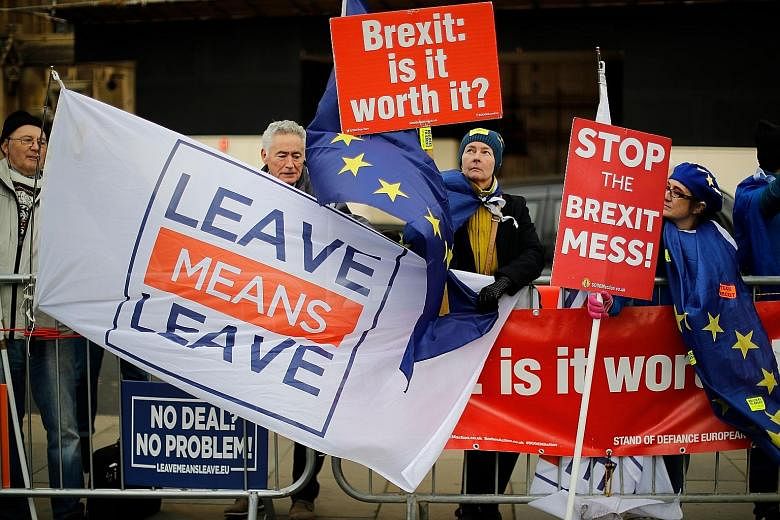LONDON • Prime Minister Theresa May said yesterday that Brexit being blocked by lawmakers was now a more likely outcome than Britain leaving the EU without a deal.
The fate of Britain's planned March 29 exit from the EU is deeply uncertain as Parliament is likely to reject Mrs May's deal this evening, opening up outcomes ranging from a disorderly divorce to reversing Brexit altogether.
Mrs May used a speech at a factory in the leave-supporting city of Stoke-on-Trent in central England to try and win over Brexit-supporting lawmakers who have repeatedly said they will vote down her divorce deal. "There are some in Westminster who would wish to delay or even stop Brexit and who will use every device available to them to do so," Mrs May said.
"While no-deal remains a serious risk, having observed the events at Westminster over the last seven days, it's now my judgment that the more likely outcome is a paralysis in Parliament that risks there being no Brexit."
Mrs May had warned lawmakers on Sunday that failing to deliver Brexit would be "catastrophic" for democracy, and her ministers said that thwarting the outcome of the 2016 referendum could lead to a rise in far-right populism.
As the world's biggest trading bloc tried to brace itself for an unpredictable ride, Spain said the European Union could agree to extend the Brexit deadline, but not beyond elections for the European Parliament due in May.
Amid the deepest crisis in British politics for at least half a century, the British Prime Minister and EU leaders yesterday exchanged letters giving assurances on her withdrawal agreement.
The EU told Mrs May that it stood by commitments to find ways to avoid triggering the controversial "Irish backstop" in their Brexit deal and that this pledge had legal weight.
In a joint reply to questions from Mrs May, European Commission president Jean-Claude Juncker and European Council president Donald Tusk said the EU stood by its commitment to try and reach a post-Brexit trade deal by the end of next year in order to avoid using the unpopular backstop.
However, even if the target date were not met, Britain would have the option to extend a status-quo transition period to avoid triggering the backstop, which is meant to avoid a hard customs border for Northern Ireland.
"If the backstop were nevertheless to be triggered, it would only apply temporarily, unless and until it is superseded by a subsequent agreement that ensures that a hard border is avoided," they said.
Mrs May said the assurances might not go far enough for some lawmakers, and the small Northern Irish party that props up her government said it was insufficient.
Meanwhile, Mr Gareth Johnson, a lawmaker, who helped enforce discipline in Mrs May's Conservative Party, quit his role yesterday, citing his "own personal objection to the agreement".
Mrs May was to make a statement to Parliament later yesterday. But with her deal facing opposition from all sides in the House of Commons, the letters are unlikely to change the fundamental outcome of the vote.
With no-deal Brexit the default option if Mrs May's deal is defeated, some lawmakers are planning to pull control of Brexit from the government to senior figures in Parliament. Though Mrs May is weakened, the executive has significant powers and it was unclear how Parliament would be able to take control of Brexit.
If Mrs May's deal is defeated and the government is unable to have any amended version passed in the next three weeks, one suggestion is for senior lawmakers who chair parliamentary committees to come up with an alternative Brexit plan.
"We're in the very, very final stages of the end-game here," said Mr Nick Boles, one of the Conservative lawmakers behind the plan, who said he would vote for Mrs May's deal.
"What we need to do is find the solution, and if the government can't find the solution - and we want the government to find the solution, and we'll be voting for her solution - but if it can't then Parliament needs to," Mr Boles added.
REUTERS











